Managing Across Cultures in Hospitality and Tourism Report
VerifiedAdded on 2019/12/03
|14
|5653
|339
Report
AI Summary
This report delves into the critical aspects of managing across cultures within the hospitality and tourism sector. It begins by defining managing across cultures and its importance, emphasizing the need to recognize and embrace cultural similarities and differences. The report then explores the impact of cultural differences on business operations, using examples to illustrate the complexities that arise from variations in working styles, languages, and communication gestures. It highlights the limitations of cross-cultural management, such as language barriers and differences in corporate versus national cultures. The report also acknowledges the contributions of cross-cultural management, including enhanced organizational productivity and increased business opportunities in a globalized world. Furthermore, it evaluates the essential skills and experiences needed for a successful career in a global workplace, focusing on leadership, cultural understanding, and adaptability. The report concludes by summarizing the key findings and emphasizing the significance of effective cross-cultural management for success in the international hospitality and tourism industry.
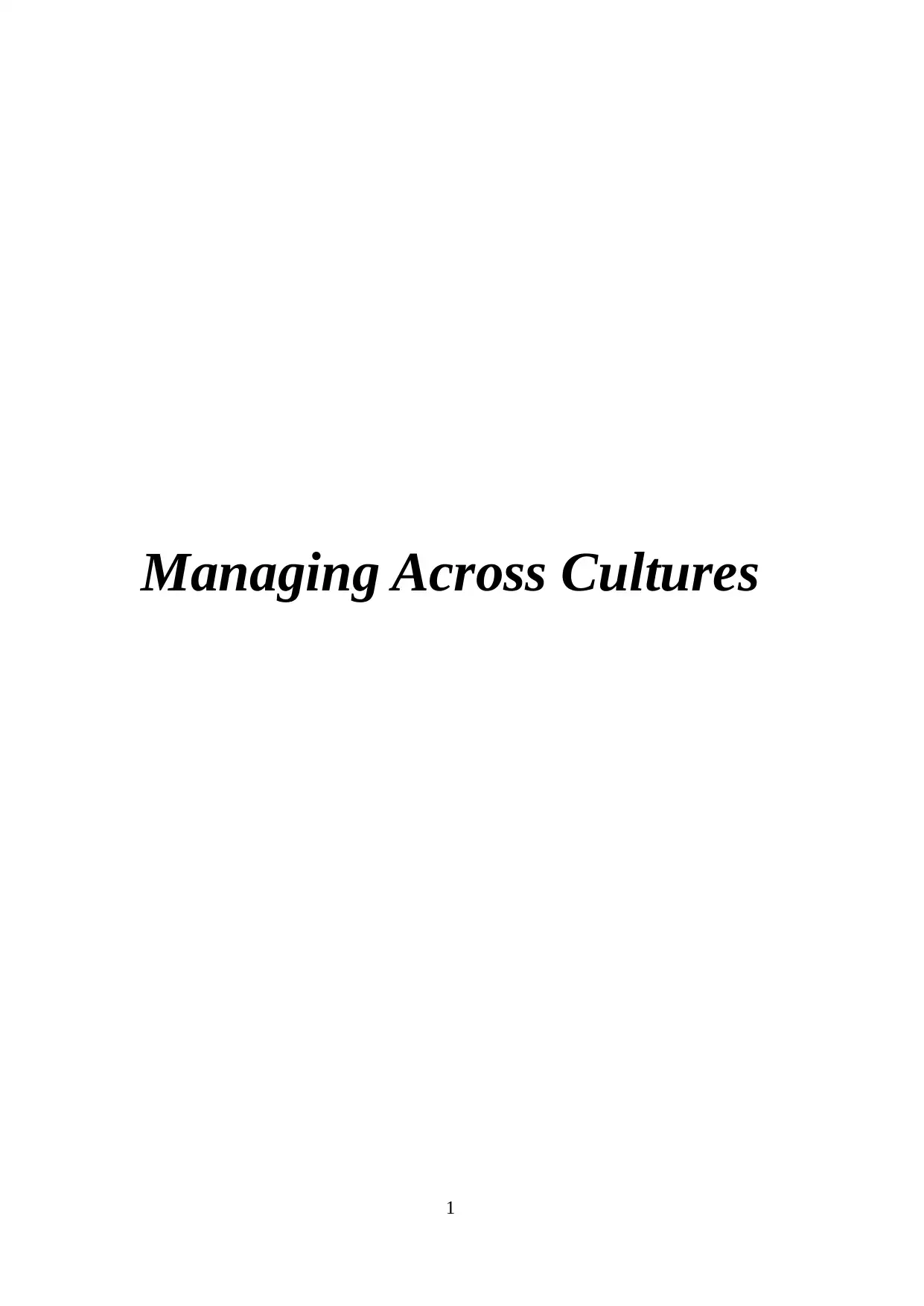
Managing Across Cultures
1
1
Paraphrase This Document
Need a fresh take? Get an instant paraphrase of this document with our AI Paraphraser
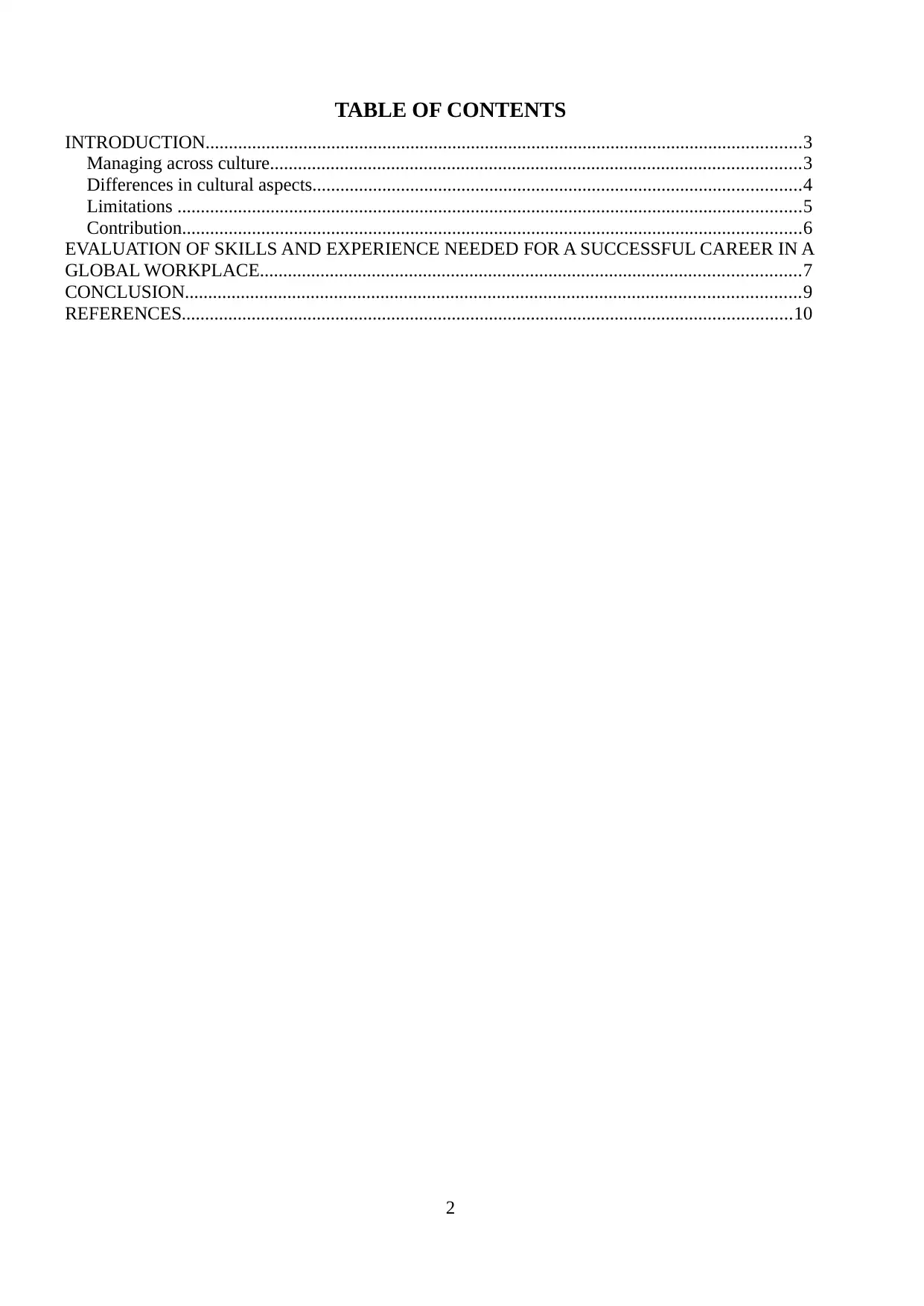
TABLE OF CONTENTS
INTRODUCTION................................................................................................................................3
Managing across culture..................................................................................................................3
Differences in cultural aspects.........................................................................................................4
Limitations ......................................................................................................................................5
Contribution.....................................................................................................................................6
EVALUATION OF SKILLS AND EXPERIENCE NEEDED FOR A SUCCESSFUL CAREER IN A
GLOBAL WORKPLACE....................................................................................................................7
CONCLUSION....................................................................................................................................9
REFERENCES...................................................................................................................................10
2
INTRODUCTION................................................................................................................................3
Managing across culture..................................................................................................................3
Differences in cultural aspects.........................................................................................................4
Limitations ......................................................................................................................................5
Contribution.....................................................................................................................................6
EVALUATION OF SKILLS AND EXPERIENCE NEEDED FOR A SUCCESSFUL CAREER IN A
GLOBAL WORKPLACE....................................................................................................................7
CONCLUSION....................................................................................................................................9
REFERENCES...................................................................................................................................10
2
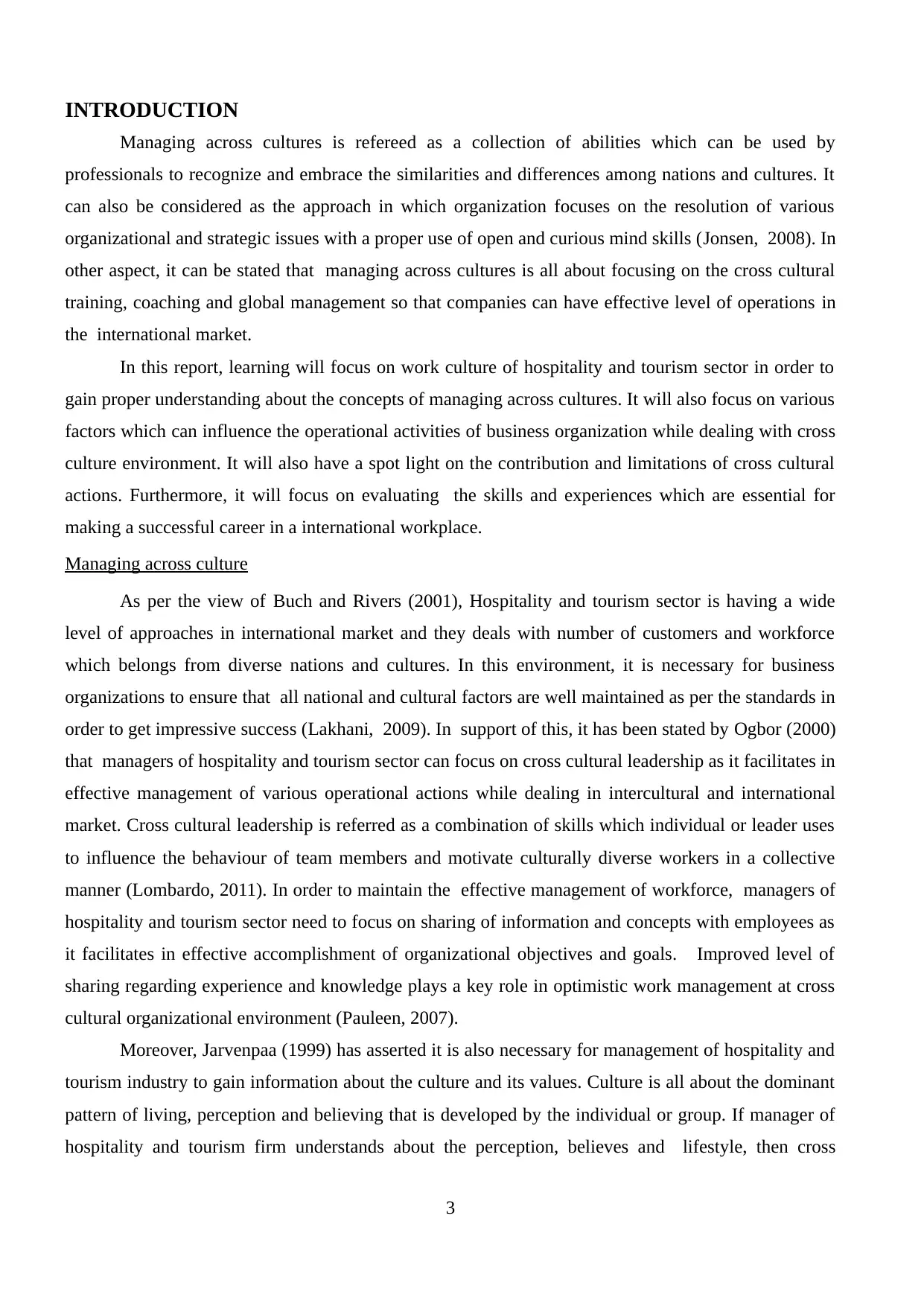
INTRODUCTION
Managing across cultures is refereed as a collection of abilities which can be used by
professionals to recognize and embrace the similarities and differences among nations and cultures. It
can also be considered as the approach in which organization focuses on the resolution of various
organizational and strategic issues with a proper use of open and curious mind skills (Jonsen, 2008). In
other aspect, it can be stated that managing across cultures is all about focusing on the cross cultural
training, coaching and global management so that companies can have effective level of operations in
the international market.
In this report, learning will focus on work culture of hospitality and tourism sector in order to
gain proper understanding about the concepts of managing across cultures. It will also focus on various
factors which can influence the operational activities of business organization while dealing with cross
culture environment. It will also have a spot light on the contribution and limitations of cross cultural
actions. Furthermore, it will focus on evaluating the skills and experiences which are essential for
making a successful career in a international workplace.
Managing across culture
As per the view of Buch and Rivers (2001), Hospitality and tourism sector is having a wide
level of approaches in international market and they deals with number of customers and workforce
which belongs from diverse nations and cultures. In this environment, it is necessary for business
organizations to ensure that all national and cultural factors are well maintained as per the standards in
order to get impressive success (Lakhani, 2009). In support of this, it has been stated by Ogbor (2000)
that managers of hospitality and tourism sector can focus on cross cultural leadership as it facilitates in
effective management of various operational actions while dealing in intercultural and international
market. Cross cultural leadership is referred as a combination of skills which individual or leader uses
to influence the behaviour of team members and motivate culturally diverse workers in a collective
manner (Lombardo, 2011). In order to maintain the effective management of workforce, managers of
hospitality and tourism sector need to focus on sharing of information and concepts with employees as
it facilitates in effective accomplishment of organizational objectives and goals. Improved level of
sharing regarding experience and knowledge plays a key role in optimistic work management at cross
cultural organizational environment (Pauleen, 2007).
Moreover, Jarvenpaa (1999) has asserted it is also necessary for management of hospitality and
tourism industry to gain information about the culture and its values. Culture is all about the dominant
pattern of living, perception and believing that is developed by the individual or group. If manager of
hospitality and tourism firm understands about the perception, believes and lifestyle, then cross
3
Managing across cultures is refereed as a collection of abilities which can be used by
professionals to recognize and embrace the similarities and differences among nations and cultures. It
can also be considered as the approach in which organization focuses on the resolution of various
organizational and strategic issues with a proper use of open and curious mind skills (Jonsen, 2008). In
other aspect, it can be stated that managing across cultures is all about focusing on the cross cultural
training, coaching and global management so that companies can have effective level of operations in
the international market.
In this report, learning will focus on work culture of hospitality and tourism sector in order to
gain proper understanding about the concepts of managing across cultures. It will also focus on various
factors which can influence the operational activities of business organization while dealing with cross
culture environment. It will also have a spot light on the contribution and limitations of cross cultural
actions. Furthermore, it will focus on evaluating the skills and experiences which are essential for
making a successful career in a international workplace.
Managing across culture
As per the view of Buch and Rivers (2001), Hospitality and tourism sector is having a wide
level of approaches in international market and they deals with number of customers and workforce
which belongs from diverse nations and cultures. In this environment, it is necessary for business
organizations to ensure that all national and cultural factors are well maintained as per the standards in
order to get impressive success (Lakhani, 2009). In support of this, it has been stated by Ogbor (2000)
that managers of hospitality and tourism sector can focus on cross cultural leadership as it facilitates in
effective management of various operational actions while dealing in intercultural and international
market. Cross cultural leadership is referred as a combination of skills which individual or leader uses
to influence the behaviour of team members and motivate culturally diverse workers in a collective
manner (Lombardo, 2011). In order to maintain the effective management of workforce, managers of
hospitality and tourism sector need to focus on sharing of information and concepts with employees as
it facilitates in effective accomplishment of organizational objectives and goals. Improved level of
sharing regarding experience and knowledge plays a key role in optimistic work management at cross
cultural organizational environment (Pauleen, 2007).
Moreover, Jarvenpaa (1999) has asserted it is also necessary for management of hospitality and
tourism industry to gain information about the culture and its values. Culture is all about the dominant
pattern of living, perception and believing that is developed by the individual or group. If manager of
hospitality and tourism firm understands about the perception, believes and lifestyle, then cross
3
⊘ This is a preview!⊘
Do you want full access?
Subscribe today to unlock all pages.

Trusted by 1+ million students worldwide
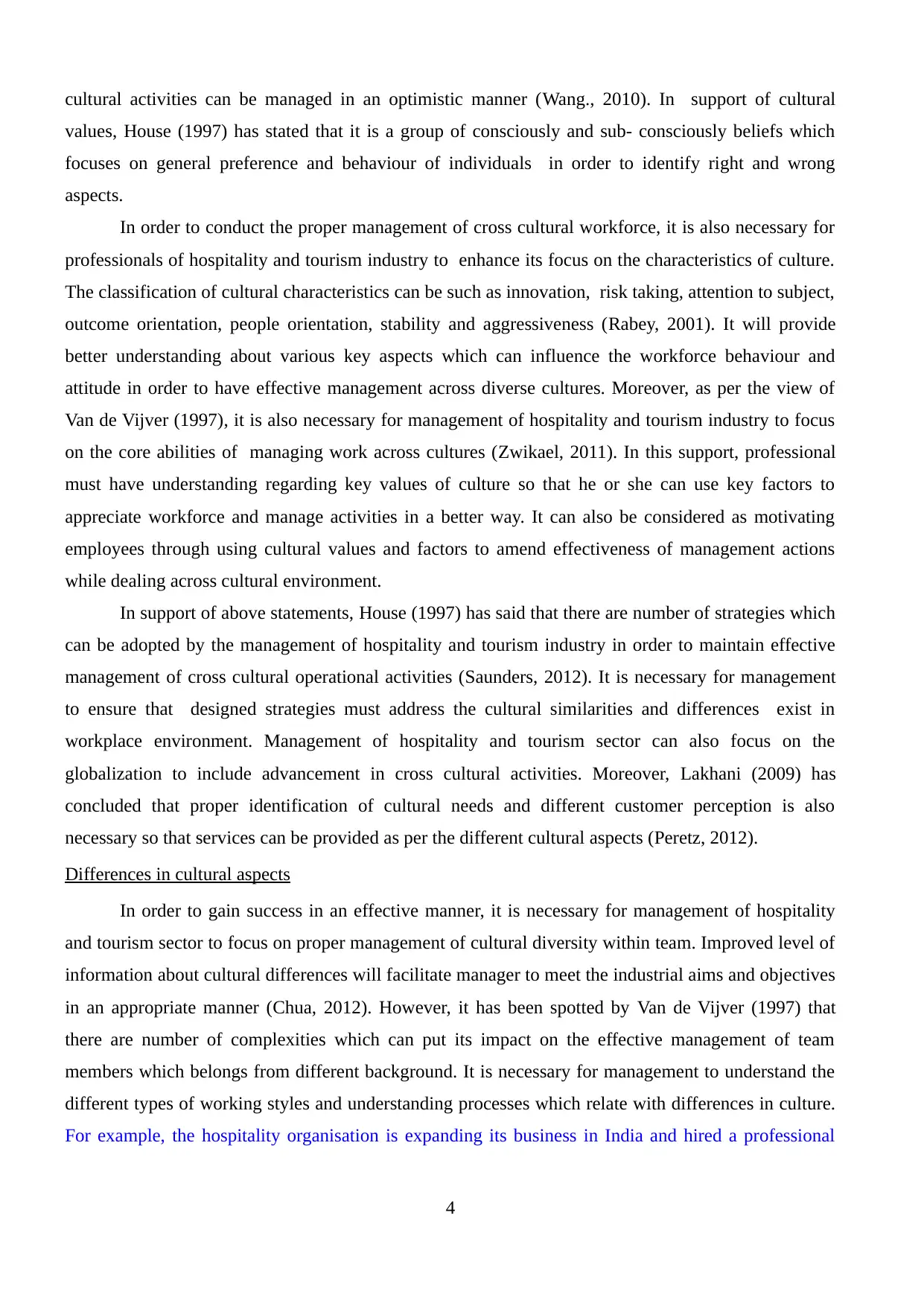
cultural activities can be managed in an optimistic manner (Wang., 2010). In support of cultural
values, House (1997) has stated that it is a group of consciously and sub- consciously beliefs which
focuses on general preference and behaviour of individuals in order to identify right and wrong
aspects.
In order to conduct the proper management of cross cultural workforce, it is also necessary for
professionals of hospitality and tourism industry to enhance its focus on the characteristics of culture.
The classification of cultural characteristics can be such as innovation, risk taking, attention to subject,
outcome orientation, people orientation, stability and aggressiveness (Rabey, 2001). It will provide
better understanding about various key aspects which can influence the workforce behaviour and
attitude in order to have effective management across diverse cultures. Moreover, as per the view of
Van de Vijver (1997), it is also necessary for management of hospitality and tourism industry to focus
on the core abilities of managing work across cultures (Zwikael, 2011). In this support, professional
must have understanding regarding key values of culture so that he or she can use key factors to
appreciate workforce and manage activities in a better way. It can also be considered as motivating
employees through using cultural values and factors to amend effectiveness of management actions
while dealing across cultural environment.
In support of above statements, House (1997) has said that there are number of strategies which
can be adopted by the management of hospitality and tourism industry in order to maintain effective
management of cross cultural operational activities (Saunders, 2012). It is necessary for management
to ensure that designed strategies must address the cultural similarities and differences exist in
workplace environment. Management of hospitality and tourism sector can also focus on the
globalization to include advancement in cross cultural activities. Moreover, Lakhani (2009) has
concluded that proper identification of cultural needs and different customer perception is also
necessary so that services can be provided as per the different cultural aspects (Peretz, 2012).
Differences in cultural aspects
In order to gain success in an effective manner, it is necessary for management of hospitality
and tourism sector to focus on proper management of cultural diversity within team. Improved level of
information about cultural differences will facilitate manager to meet the industrial aims and objectives
in an appropriate manner (Chua, 2012). However, it has been spotted by Van de Vijver (1997) that
there are number of complexities which can put its impact on the effective management of team
members which belongs from different background. It is necessary for management to understand the
different types of working styles and understanding processes which relate with differences in culture.
For example, the hospitality organisation is expanding its business in India and hired a professional
4
values, House (1997) has stated that it is a group of consciously and sub- consciously beliefs which
focuses on general preference and behaviour of individuals in order to identify right and wrong
aspects.
In order to conduct the proper management of cross cultural workforce, it is also necessary for
professionals of hospitality and tourism industry to enhance its focus on the characteristics of culture.
The classification of cultural characteristics can be such as innovation, risk taking, attention to subject,
outcome orientation, people orientation, stability and aggressiveness (Rabey, 2001). It will provide
better understanding about various key aspects which can influence the workforce behaviour and
attitude in order to have effective management across diverse cultures. Moreover, as per the view of
Van de Vijver (1997), it is also necessary for management of hospitality and tourism industry to focus
on the core abilities of managing work across cultures (Zwikael, 2011). In this support, professional
must have understanding regarding key values of culture so that he or she can use key factors to
appreciate workforce and manage activities in a better way. It can also be considered as motivating
employees through using cultural values and factors to amend effectiveness of management actions
while dealing across cultural environment.
In support of above statements, House (1997) has said that there are number of strategies which
can be adopted by the management of hospitality and tourism industry in order to maintain effective
management of cross cultural operational activities (Saunders, 2012). It is necessary for management
to ensure that designed strategies must address the cultural similarities and differences exist in
workplace environment. Management of hospitality and tourism sector can also focus on the
globalization to include advancement in cross cultural activities. Moreover, Lakhani (2009) has
concluded that proper identification of cultural needs and different customer perception is also
necessary so that services can be provided as per the different cultural aspects (Peretz, 2012).
Differences in cultural aspects
In order to gain success in an effective manner, it is necessary for management of hospitality
and tourism sector to focus on proper management of cultural diversity within team. Improved level of
information about cultural differences will facilitate manager to meet the industrial aims and objectives
in an appropriate manner (Chua, 2012). However, it has been spotted by Van de Vijver (1997) that
there are number of complexities which can put its impact on the effective management of team
members which belongs from different background. It is necessary for management to understand the
different types of working styles and understanding processes which relate with differences in culture.
For example, the hospitality organisation is expanding its business in India and hired a professional
4
Paraphrase This Document
Need a fresh take? Get an instant paraphrase of this document with our AI Paraphraser
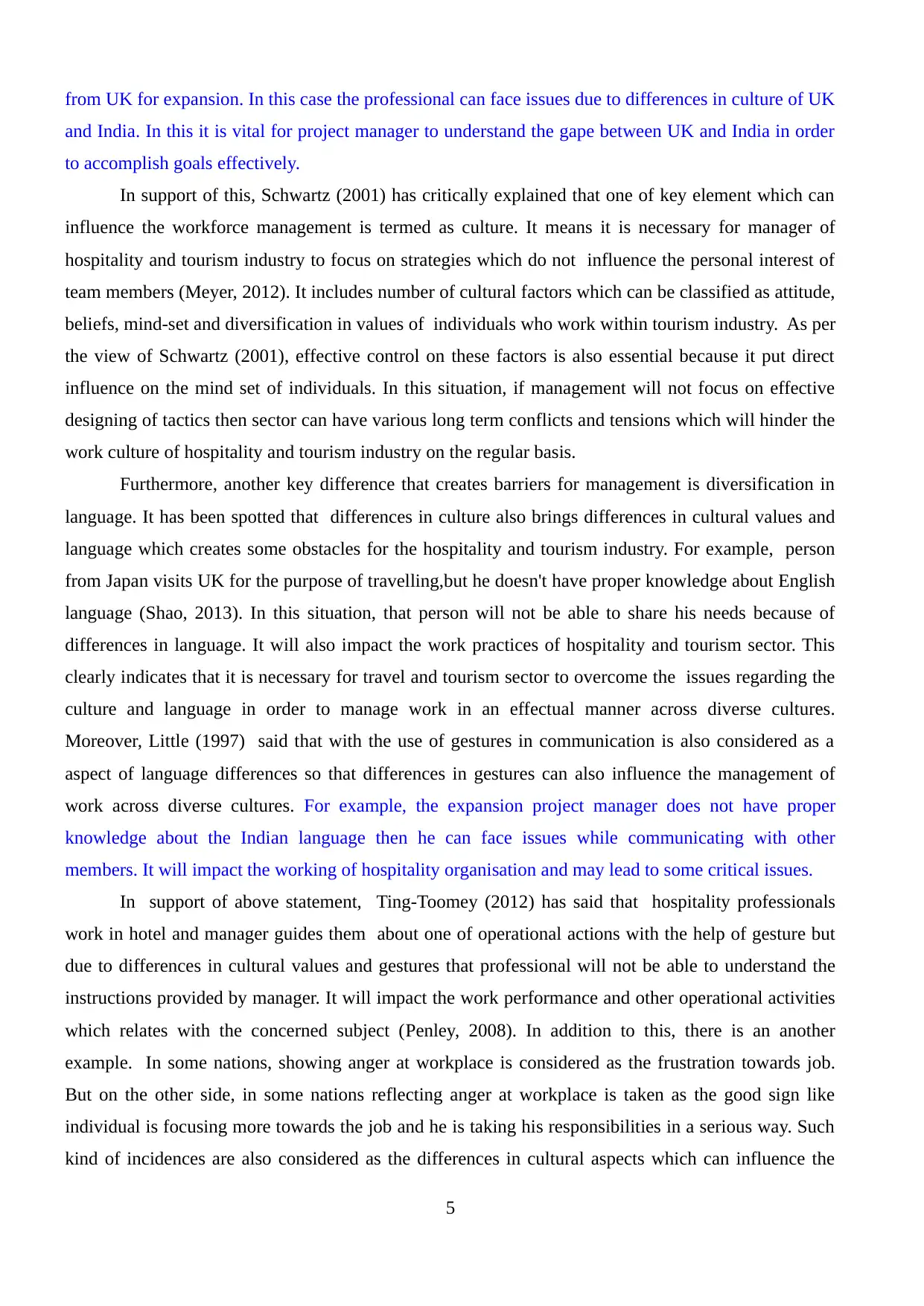
from UK for expansion. In this case the professional can face issues due to differences in culture of UK
and India. In this it is vital for project manager to understand the gape between UK and India in order
to accomplish goals effectively.
In support of this, Schwartz (2001) has critically explained that one of key element which can
influence the workforce management is termed as culture. It means it is necessary for manager of
hospitality and tourism industry to focus on strategies which do not influence the personal interest of
team members (Meyer, 2012). It includes number of cultural factors which can be classified as attitude,
beliefs, mind-set and diversification in values of individuals who work within tourism industry. As per
the view of Schwartz (2001), effective control on these factors is also essential because it put direct
influence on the mind set of individuals. In this situation, if management will not focus on effective
designing of tactics then sector can have various long term conflicts and tensions which will hinder the
work culture of hospitality and tourism industry on the regular basis.
Furthermore, another key difference that creates barriers for management is diversification in
language. It has been spotted that differences in culture also brings differences in cultural values and
language which creates some obstacles for the hospitality and tourism industry. For example, person
from Japan visits UK for the purpose of travelling,but he doesn't have proper knowledge about English
language (Shao, 2013). In this situation, that person will not be able to share his needs because of
differences in language. It will also impact the work practices of hospitality and tourism sector. This
clearly indicates that it is necessary for travel and tourism sector to overcome the issues regarding the
culture and language in order to manage work in an effectual manner across diverse cultures.
Moreover, Little (1997) said that with the use of gestures in communication is also considered as a
aspect of language differences so that differences in gestures can also influence the management of
work across diverse cultures. For example, the expansion project manager does not have proper
knowledge about the Indian language then he can face issues while communicating with other
members. It will impact the working of hospitality organisation and may lead to some critical issues.
In support of above statement, Ting-Toomey (2012) has said that hospitality professionals
work in hotel and manager guides them about one of operational actions with the help of gesture but
due to differences in cultural values and gestures that professional will not be able to understand the
instructions provided by manager. It will impact the work performance and other operational activities
which relates with the concerned subject (Penley, 2008). In addition to this, there is an another
example. In some nations, showing anger at workplace is considered as the frustration towards job.
But on the other side, in some nations reflecting anger at workplace is taken as the good sign like
individual is focusing more towards the job and he is taking his responsibilities in a serious way. Such
kind of incidences are also considered as the differences in cultural aspects which can influence the
5
and India. In this it is vital for project manager to understand the gape between UK and India in order
to accomplish goals effectively.
In support of this, Schwartz (2001) has critically explained that one of key element which can
influence the workforce management is termed as culture. It means it is necessary for manager of
hospitality and tourism industry to focus on strategies which do not influence the personal interest of
team members (Meyer, 2012). It includes number of cultural factors which can be classified as attitude,
beliefs, mind-set and diversification in values of individuals who work within tourism industry. As per
the view of Schwartz (2001), effective control on these factors is also essential because it put direct
influence on the mind set of individuals. In this situation, if management will not focus on effective
designing of tactics then sector can have various long term conflicts and tensions which will hinder the
work culture of hospitality and tourism industry on the regular basis.
Furthermore, another key difference that creates barriers for management is diversification in
language. It has been spotted that differences in culture also brings differences in cultural values and
language which creates some obstacles for the hospitality and tourism industry. For example, person
from Japan visits UK for the purpose of travelling,but he doesn't have proper knowledge about English
language (Shao, 2013). In this situation, that person will not be able to share his needs because of
differences in language. It will also impact the work practices of hospitality and tourism sector. This
clearly indicates that it is necessary for travel and tourism sector to overcome the issues regarding the
culture and language in order to manage work in an effectual manner across diverse cultures.
Moreover, Little (1997) said that with the use of gestures in communication is also considered as a
aspect of language differences so that differences in gestures can also influence the management of
work across diverse cultures. For example, the expansion project manager does not have proper
knowledge about the Indian language then he can face issues while communicating with other
members. It will impact the working of hospitality organisation and may lead to some critical issues.
In support of above statement, Ting-Toomey (2012) has said that hospitality professionals
work in hotel and manager guides them about one of operational actions with the help of gesture but
due to differences in cultural values and gestures that professional will not be able to understand the
instructions provided by manager. It will impact the work performance and other operational activities
which relates with the concerned subject (Penley, 2008). In addition to this, there is an another
example. In some nations, showing anger at workplace is considered as the frustration towards job.
But on the other side, in some nations reflecting anger at workplace is taken as the good sign like
individual is focusing more towards the job and he is taking his responsibilities in a serious way. Such
kind of incidences are also considered as the differences in cultural aspects which can influence the
5
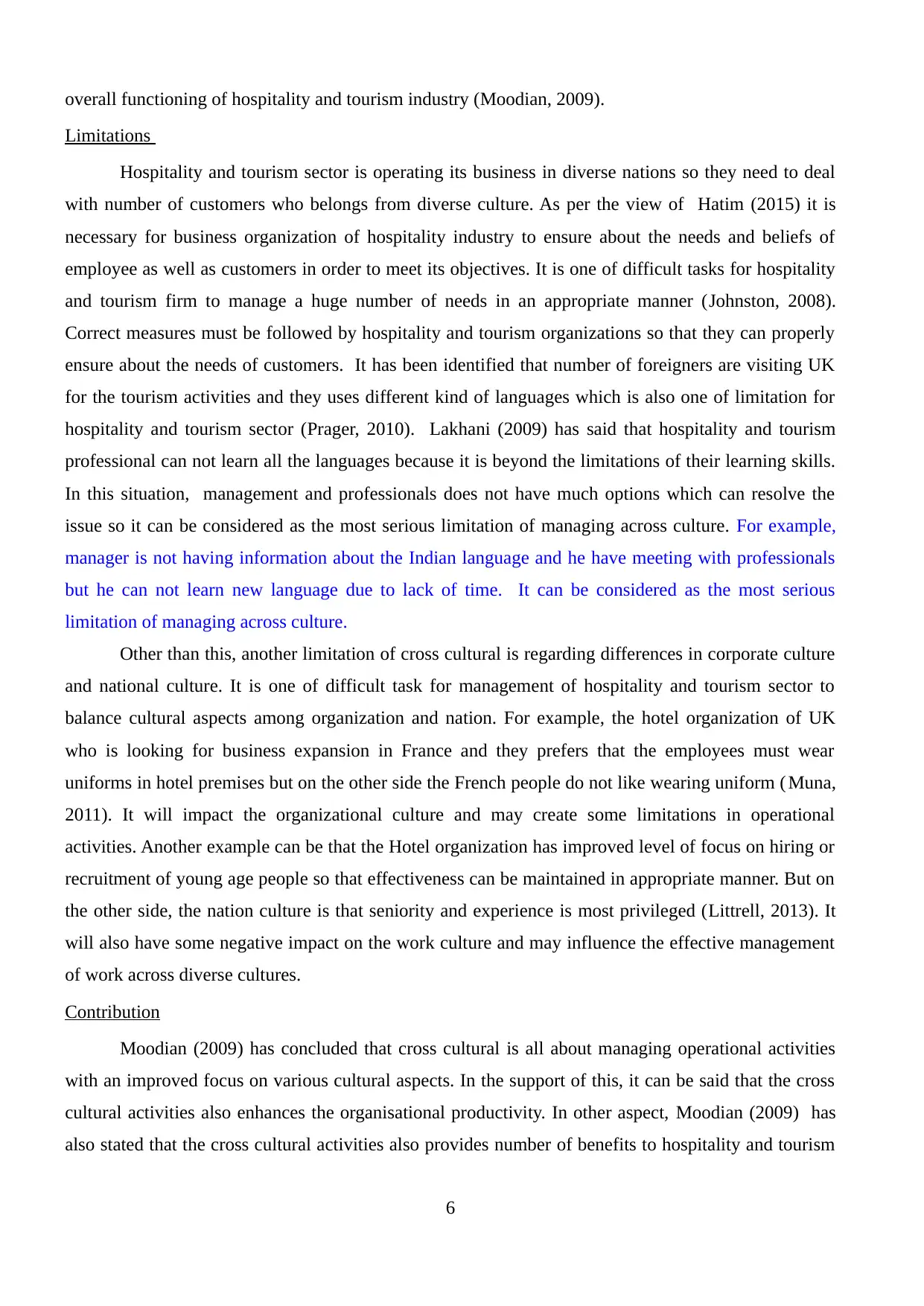
overall functioning of hospitality and tourism industry (Moodian, 2009).
Limitations
Hospitality and tourism sector is operating its business in diverse nations so they need to deal
with number of customers who belongs from diverse culture. As per the view of Hatim (2015) it is
necessary for business organization of hospitality industry to ensure about the needs and beliefs of
employee as well as customers in order to meet its objectives. It is one of difficult tasks for hospitality
and tourism firm to manage a huge number of needs in an appropriate manner (Johnston, 2008).
Correct measures must be followed by hospitality and tourism organizations so that they can properly
ensure about the needs of customers. It has been identified that number of foreigners are visiting UK
for the tourism activities and they uses different kind of languages which is also one of limitation for
hospitality and tourism sector (Prager, 2010). Lakhani (2009) has said that hospitality and tourism
professional can not learn all the languages because it is beyond the limitations of their learning skills.
In this situation, management and professionals does not have much options which can resolve the
issue so it can be considered as the most serious limitation of managing across culture. For example,
manager is not having information about the Indian language and he have meeting with professionals
but he can not learn new language due to lack of time. It can be considered as the most serious
limitation of managing across culture.
Other than this, another limitation of cross cultural is regarding differences in corporate culture
and national culture. It is one of difficult task for management of hospitality and tourism sector to
balance cultural aspects among organization and nation. For example, the hotel organization of UK
who is looking for business expansion in France and they prefers that the employees must wear
uniforms in hotel premises but on the other side the French people do not like wearing uniform ( Muna,
2011). It will impact the organizational culture and may create some limitations in operational
activities. Another example can be that the Hotel organization has improved level of focus on hiring or
recruitment of young age people so that effectiveness can be maintained in appropriate manner. But on
the other side, the nation culture is that seniority and experience is most privileged (Littrell, 2013). It
will also have some negative impact on the work culture and may influence the effective management
of work across diverse cultures.
Contribution
Moodian (2009) has concluded that cross cultural is all about managing operational activities
with an improved focus on various cultural aspects. In the support of this, it can be said that the cross
cultural activities also enhances the organisational productivity. In other aspect, Moodian (2009) has
also stated that the cross cultural activities also provides number of benefits to hospitality and tourism
6
Limitations
Hospitality and tourism sector is operating its business in diverse nations so they need to deal
with number of customers who belongs from diverse culture. As per the view of Hatim (2015) it is
necessary for business organization of hospitality industry to ensure about the needs and beliefs of
employee as well as customers in order to meet its objectives. It is one of difficult tasks for hospitality
and tourism firm to manage a huge number of needs in an appropriate manner (Johnston, 2008).
Correct measures must be followed by hospitality and tourism organizations so that they can properly
ensure about the needs of customers. It has been identified that number of foreigners are visiting UK
for the tourism activities and they uses different kind of languages which is also one of limitation for
hospitality and tourism sector (Prager, 2010). Lakhani (2009) has said that hospitality and tourism
professional can not learn all the languages because it is beyond the limitations of their learning skills.
In this situation, management and professionals does not have much options which can resolve the
issue so it can be considered as the most serious limitation of managing across culture. For example,
manager is not having information about the Indian language and he have meeting with professionals
but he can not learn new language due to lack of time. It can be considered as the most serious
limitation of managing across culture.
Other than this, another limitation of cross cultural is regarding differences in corporate culture
and national culture. It is one of difficult task for management of hospitality and tourism sector to
balance cultural aspects among organization and nation. For example, the hotel organization of UK
who is looking for business expansion in France and they prefers that the employees must wear
uniforms in hotel premises but on the other side the French people do not like wearing uniform ( Muna,
2011). It will impact the organizational culture and may create some limitations in operational
activities. Another example can be that the Hotel organization has improved level of focus on hiring or
recruitment of young age people so that effectiveness can be maintained in appropriate manner. But on
the other side, the nation culture is that seniority and experience is most privileged (Littrell, 2013). It
will also have some negative impact on the work culture and may influence the effective management
of work across diverse cultures.
Contribution
Moodian (2009) has concluded that cross cultural is all about managing operational activities
with an improved focus on various cultural aspects. In the support of this, it can be said that the cross
cultural activities also enhances the organisational productivity. In other aspect, Moodian (2009) has
also stated that the cross cultural activities also provides number of benefits to hospitality and tourism
6
⊘ This is a preview!⊘
Do you want full access?
Subscribe today to unlock all pages.

Trusted by 1+ million students worldwide

industry (Buch, 2001). Increased level of globalization and cross cultural activities boosts the business
opportunities for hospitality and tourism industry. It allow business organisations to trade their
activities in all over the world and enhance the operational opportunities.
Moreover, as per the view of Muna (2011) cross cultural activities also provides wide level of
knowledge regarding diverse cultural aspects. It also enhances the skills of employees regarding
cultural aspects which allows them to deal with number of clients who belongs from diverse nations
and culture (Littrell, 2013). In the support of this, Littrell (2013) has said that while working in
international market and cross cultural environment the employees can gather information about belief
of various people who belongs from diverse nations. It also contributes in advancement of employees
skills by providing them information regarding various languages which facilitate them in dealing with
diverse customers (Muna, 2011). It also boosts the opportunities of hospitality and tourism industry
and helps in meeting satisfaction level of diverse customers.
Other than this, it has also been spotted by Prager (2010) that these kinds of actions also amend
the awareness regarding cross cultural which is beneficial for attaining advanced competitive
advantage. It also allows hospitality industry professional to have better interaction with diversified
clients which increases the motivation level of employees and facilitate in meeting needs of customers
(Prager, 2010). It also increases the informal exchange of information which is beneficial for
advancement in learning of hospitality and tourism sector professionals.
Furthermore, it also have positive impact on the cross cultural behavioural aspects which
amends the effectiveness of operational actions. In the support of this, Johnston (2008) has stated that
cross cultural provides information about world class standards in context of tourism services. It
motivates domestic tourism firms to adopt global standards and amend the effectiveness of services
(Johnston, 2008). It also boosts the productivity and quality of services which is beneficial for
advancement in opportunities of tourism sector. Moreover, it also enhances the world involvement and
provide enhanced level of information about industrial trends in global market. It allows management
of hospitality and tourism firm to work in collective manner so that global needs can be meet in
appropriate manner.
EVALUATION OF SKILLS AND EXPERIENCE NEEDED FOR A
SUCCESSFUL CAREER IN A GLOBAL WORKPLACE
Cross cultural work environment means the an hospitality and tourism professional need to deal
with various factors in order to meet the objectives. In the support of this, it can be stated it is
necessary for hospitality industry professional to have improved knowledge of cultural factors in order
to meet the objectives. In other aspect, it can be asserted that individual needs various skills for
7
opportunities for hospitality and tourism industry. It allow business organisations to trade their
activities in all over the world and enhance the operational opportunities.
Moreover, as per the view of Muna (2011) cross cultural activities also provides wide level of
knowledge regarding diverse cultural aspects. It also enhances the skills of employees regarding
cultural aspects which allows them to deal with number of clients who belongs from diverse nations
and culture (Littrell, 2013). In the support of this, Littrell (2013) has said that while working in
international market and cross cultural environment the employees can gather information about belief
of various people who belongs from diverse nations. It also contributes in advancement of employees
skills by providing them information regarding various languages which facilitate them in dealing with
diverse customers (Muna, 2011). It also boosts the opportunities of hospitality and tourism industry
and helps in meeting satisfaction level of diverse customers.
Other than this, it has also been spotted by Prager (2010) that these kinds of actions also amend
the awareness regarding cross cultural which is beneficial for attaining advanced competitive
advantage. It also allows hospitality industry professional to have better interaction with diversified
clients which increases the motivation level of employees and facilitate in meeting needs of customers
(Prager, 2010). It also increases the informal exchange of information which is beneficial for
advancement in learning of hospitality and tourism sector professionals.
Furthermore, it also have positive impact on the cross cultural behavioural aspects which
amends the effectiveness of operational actions. In the support of this, Johnston (2008) has stated that
cross cultural provides information about world class standards in context of tourism services. It
motivates domestic tourism firms to adopt global standards and amend the effectiveness of services
(Johnston, 2008). It also boosts the productivity and quality of services which is beneficial for
advancement in opportunities of tourism sector. Moreover, it also enhances the world involvement and
provide enhanced level of information about industrial trends in global market. It allows management
of hospitality and tourism firm to work in collective manner so that global needs can be meet in
appropriate manner.
EVALUATION OF SKILLS AND EXPERIENCE NEEDED FOR A
SUCCESSFUL CAREER IN A GLOBAL WORKPLACE
Cross cultural work environment means the an hospitality and tourism professional need to deal
with various factors in order to meet the objectives. In the support of this, it can be stated it is
necessary for hospitality industry professional to have improved knowledge of cultural factors in order
to meet the objectives. In other aspect, it can be asserted that individual needs various skills for
7
Paraphrase This Document
Need a fresh take? Get an instant paraphrase of this document with our AI Paraphraser
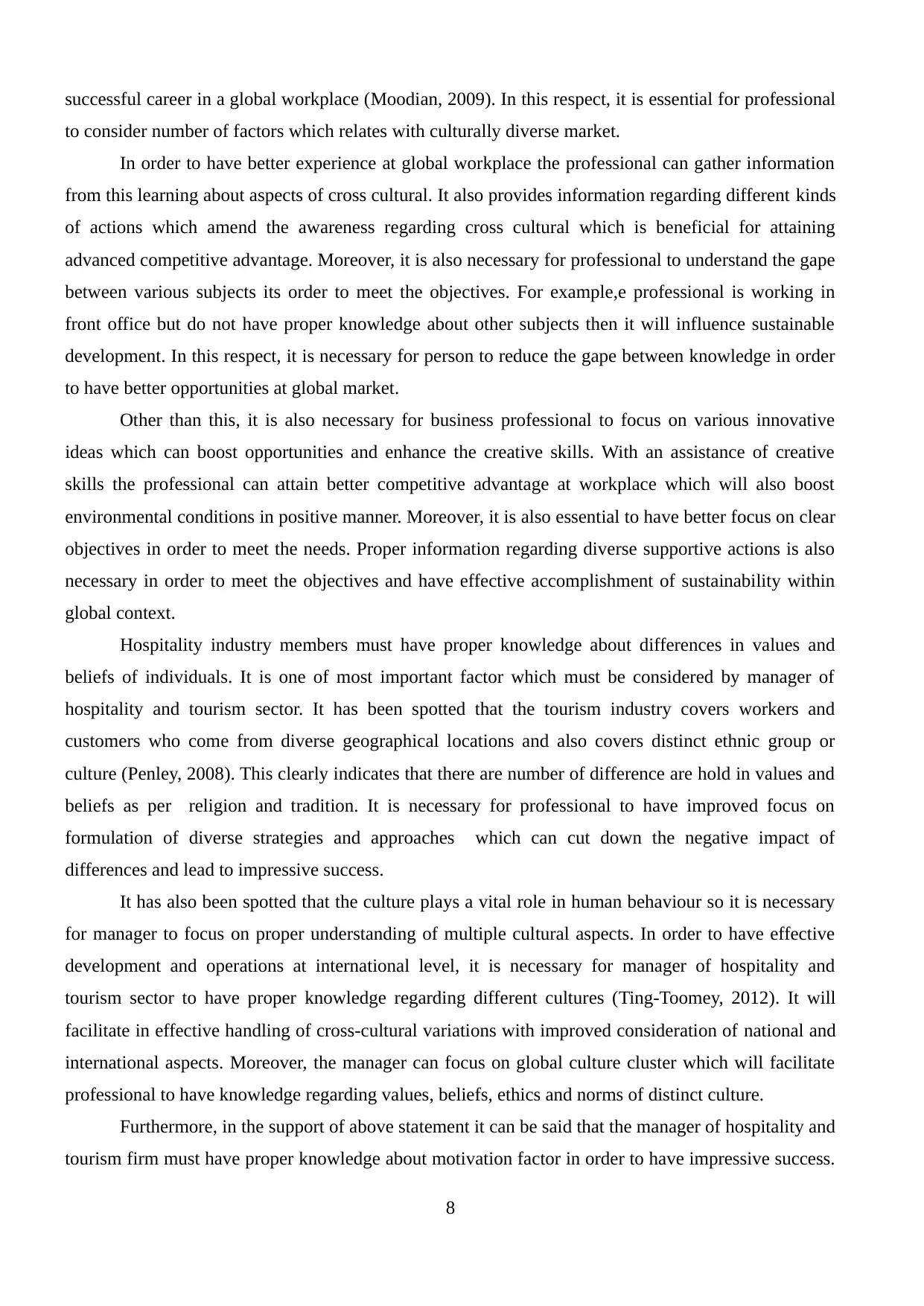
successful career in a global workplace (Moodian, 2009). In this respect, it is essential for professional
to consider number of factors which relates with culturally diverse market.
In order to have better experience at global workplace the professional can gather information
from this learning about aspects of cross cultural. It also provides information regarding different kinds
of actions which amend the awareness regarding cross cultural which is beneficial for attaining
advanced competitive advantage. Moreover, it is also necessary for professional to understand the gape
between various subjects its order to meet the objectives. For example,e professional is working in
front office but do not have proper knowledge about other subjects then it will influence sustainable
development. In this respect, it is necessary for person to reduce the gape between knowledge in order
to have better opportunities at global market.
Other than this, it is also necessary for business professional to focus on various innovative
ideas which can boost opportunities and enhance the creative skills. With an assistance of creative
skills the professional can attain better competitive advantage at workplace which will also boost
environmental conditions in positive manner. Moreover, it is also essential to have better focus on clear
objectives in order to meet the needs. Proper information regarding diverse supportive actions is also
necessary in order to meet the objectives and have effective accomplishment of sustainability within
global context.
Hospitality industry members must have proper knowledge about differences in values and
beliefs of individuals. It is one of most important factor which must be considered by manager of
hospitality and tourism sector. It has been spotted that the tourism industry covers workers and
customers who come from diverse geographical locations and also covers distinct ethnic group or
culture (Penley, 2008). This clearly indicates that there are number of difference are hold in values and
beliefs as per religion and tradition. It is necessary for professional to have improved focus on
formulation of diverse strategies and approaches which can cut down the negative impact of
differences and lead to impressive success.
It has also been spotted that the culture plays a vital role in human behaviour so it is necessary
for manager to focus on proper understanding of multiple cultural aspects. In order to have effective
development and operations at international level, it is necessary for manager of hospitality and
tourism sector to have proper knowledge regarding different cultures (Ting-Toomey, 2012). It will
facilitate in effective handling of cross-cultural variations with improved consideration of national and
international aspects. Moreover, the manager can focus on global culture cluster which will facilitate
professional to have knowledge regarding values, beliefs, ethics and norms of distinct culture.
Furthermore, in the support of above statement it can be said that the manager of hospitality and
tourism firm must have proper knowledge about motivation factor in order to have impressive success.
8
to consider number of factors which relates with culturally diverse market.
In order to have better experience at global workplace the professional can gather information
from this learning about aspects of cross cultural. It also provides information regarding different kinds
of actions which amend the awareness regarding cross cultural which is beneficial for attaining
advanced competitive advantage. Moreover, it is also necessary for professional to understand the gape
between various subjects its order to meet the objectives. For example,e professional is working in
front office but do not have proper knowledge about other subjects then it will influence sustainable
development. In this respect, it is necessary for person to reduce the gape between knowledge in order
to have better opportunities at global market.
Other than this, it is also necessary for business professional to focus on various innovative
ideas which can boost opportunities and enhance the creative skills. With an assistance of creative
skills the professional can attain better competitive advantage at workplace which will also boost
environmental conditions in positive manner. Moreover, it is also essential to have better focus on clear
objectives in order to meet the needs. Proper information regarding diverse supportive actions is also
necessary in order to meet the objectives and have effective accomplishment of sustainability within
global context.
Hospitality industry members must have proper knowledge about differences in values and
beliefs of individuals. It is one of most important factor which must be considered by manager of
hospitality and tourism sector. It has been spotted that the tourism industry covers workers and
customers who come from diverse geographical locations and also covers distinct ethnic group or
culture (Penley, 2008). This clearly indicates that there are number of difference are hold in values and
beliefs as per religion and tradition. It is necessary for professional to have improved focus on
formulation of diverse strategies and approaches which can cut down the negative impact of
differences and lead to impressive success.
It has also been spotted that the culture plays a vital role in human behaviour so it is necessary
for manager to focus on proper understanding of multiple cultural aspects. In order to have effective
development and operations at international level, it is necessary for manager of hospitality and
tourism sector to have proper knowledge regarding different cultures (Ting-Toomey, 2012). It will
facilitate in effective handling of cross-cultural variations with improved consideration of national and
international aspects. Moreover, the manager can focus on global culture cluster which will facilitate
professional to have knowledge regarding values, beliefs, ethics and norms of distinct culture.
Furthermore, in the support of above statement it can be said that the manager of hospitality and
tourism firm must have proper knowledge about motivation factor in order to have impressive success.
8
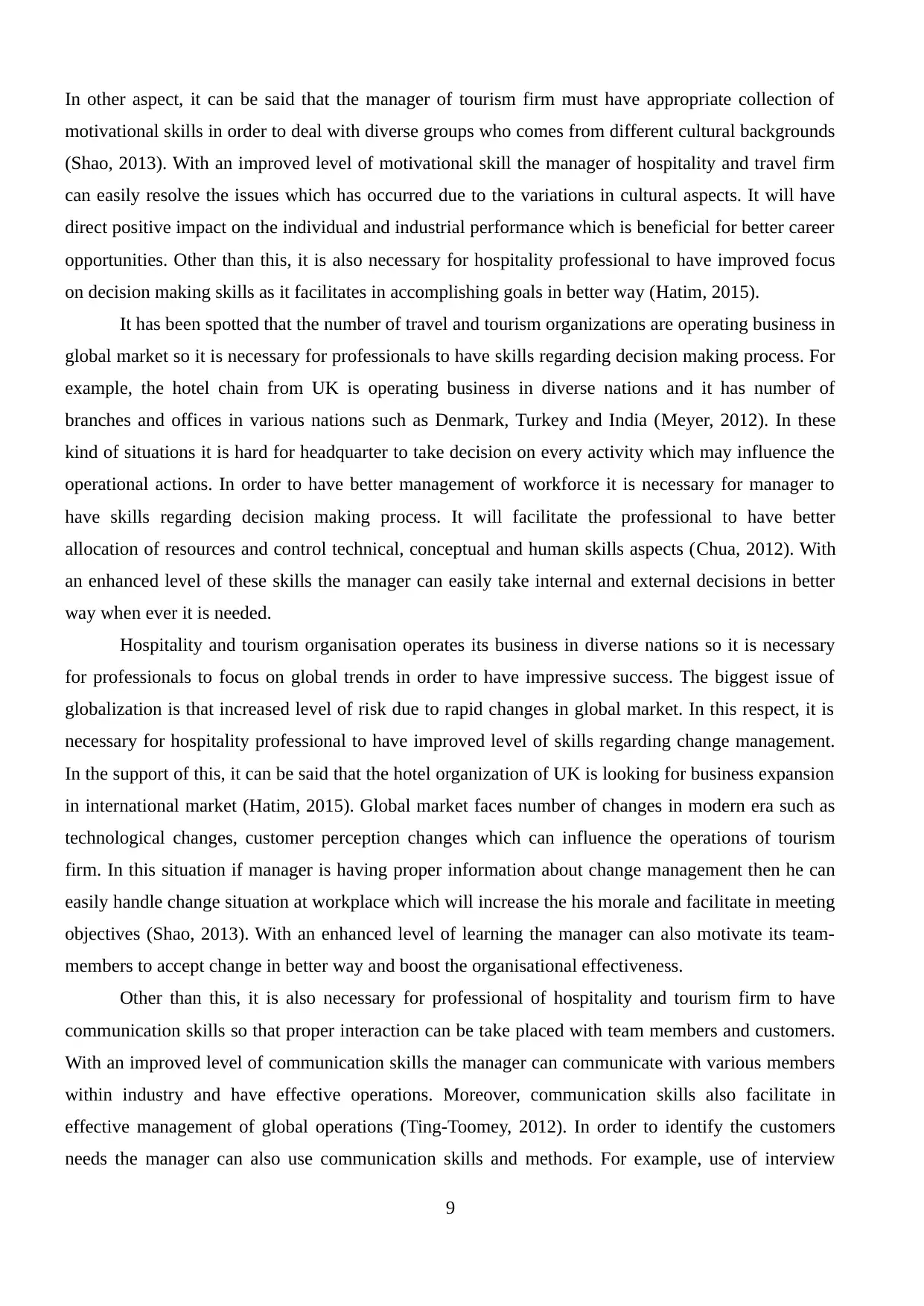
In other aspect, it can be said that the manager of tourism firm must have appropriate collection of
motivational skills in order to deal with diverse groups who comes from different cultural backgrounds
(Shao, 2013). With an improved level of motivational skill the manager of hospitality and travel firm
can easily resolve the issues which has occurred due to the variations in cultural aspects. It will have
direct positive impact on the individual and industrial performance which is beneficial for better career
opportunities. Other than this, it is also necessary for hospitality professional to have improved focus
on decision making skills as it facilitates in accomplishing goals in better way (Hatim, 2015).
It has been spotted that the number of travel and tourism organizations are operating business in
global market so it is necessary for professionals to have skills regarding decision making process. For
example, the hotel chain from UK is operating business in diverse nations and it has number of
branches and offices in various nations such as Denmark, Turkey and India (Meyer, 2012). In these
kind of situations it is hard for headquarter to take decision on every activity which may influence the
operational actions. In order to have better management of workforce it is necessary for manager to
have skills regarding decision making process. It will facilitate the professional to have better
allocation of resources and control technical, conceptual and human skills aspects (Chua, 2012). With
an enhanced level of these skills the manager can easily take internal and external decisions in better
way when ever it is needed.
Hospitality and tourism organisation operates its business in diverse nations so it is necessary
for professionals to focus on global trends in order to have impressive success. The biggest issue of
globalization is that increased level of risk due to rapid changes in global market. In this respect, it is
necessary for hospitality professional to have improved level of skills regarding change management.
In the support of this, it can be said that the hotel organization of UK is looking for business expansion
in international market (Hatim, 2015). Global market faces number of changes in modern era such as
technological changes, customer perception changes which can influence the operations of tourism
firm. In this situation if manager is having proper information about change management then he can
easily handle change situation at workplace which will increase the his morale and facilitate in meeting
objectives (Shao, 2013). With an enhanced level of learning the manager can also motivate its team-
members to accept change in better way and boost the organisational effectiveness.
Other than this, it is also necessary for professional of hospitality and tourism firm to have
communication skills so that proper interaction can be take placed with team members and customers.
With an improved level of communication skills the manager can communicate with various members
within industry and have effective operations. Moreover, communication skills also facilitate in
effective management of global operations (Ting-Toomey, 2012). In order to identify the customers
needs the manager can also use communication skills and methods. For example, use of interview
9
motivational skills in order to deal with diverse groups who comes from different cultural backgrounds
(Shao, 2013). With an improved level of motivational skill the manager of hospitality and travel firm
can easily resolve the issues which has occurred due to the variations in cultural aspects. It will have
direct positive impact on the individual and industrial performance which is beneficial for better career
opportunities. Other than this, it is also necessary for hospitality professional to have improved focus
on decision making skills as it facilitates in accomplishing goals in better way (Hatim, 2015).
It has been spotted that the number of travel and tourism organizations are operating business in
global market so it is necessary for professionals to have skills regarding decision making process. For
example, the hotel chain from UK is operating business in diverse nations and it has number of
branches and offices in various nations such as Denmark, Turkey and India (Meyer, 2012). In these
kind of situations it is hard for headquarter to take decision on every activity which may influence the
operational actions. In order to have better management of workforce it is necessary for manager to
have skills regarding decision making process. It will facilitate the professional to have better
allocation of resources and control technical, conceptual and human skills aspects (Chua, 2012). With
an enhanced level of these skills the manager can easily take internal and external decisions in better
way when ever it is needed.
Hospitality and tourism organisation operates its business in diverse nations so it is necessary
for professionals to focus on global trends in order to have impressive success. The biggest issue of
globalization is that increased level of risk due to rapid changes in global market. In this respect, it is
necessary for hospitality professional to have improved level of skills regarding change management.
In the support of this, it can be said that the hotel organization of UK is looking for business expansion
in international market (Hatim, 2015). Global market faces number of changes in modern era such as
technological changes, customer perception changes which can influence the operations of tourism
firm. In this situation if manager is having proper information about change management then he can
easily handle change situation at workplace which will increase the his morale and facilitate in meeting
objectives (Shao, 2013). With an enhanced level of learning the manager can also motivate its team-
members to accept change in better way and boost the organisational effectiveness.
Other than this, it is also necessary for professional of hospitality and tourism firm to have
communication skills so that proper interaction can be take placed with team members and customers.
With an improved level of communication skills the manager can communicate with various members
within industry and have effective operations. Moreover, communication skills also facilitate in
effective management of global operations (Ting-Toomey, 2012). In order to identify the customers
needs the manager can also use communication skills and methods. For example, use of interview
9
⊘ This is a preview!⊘
Do you want full access?
Subscribe today to unlock all pages.

Trusted by 1+ million students worldwide
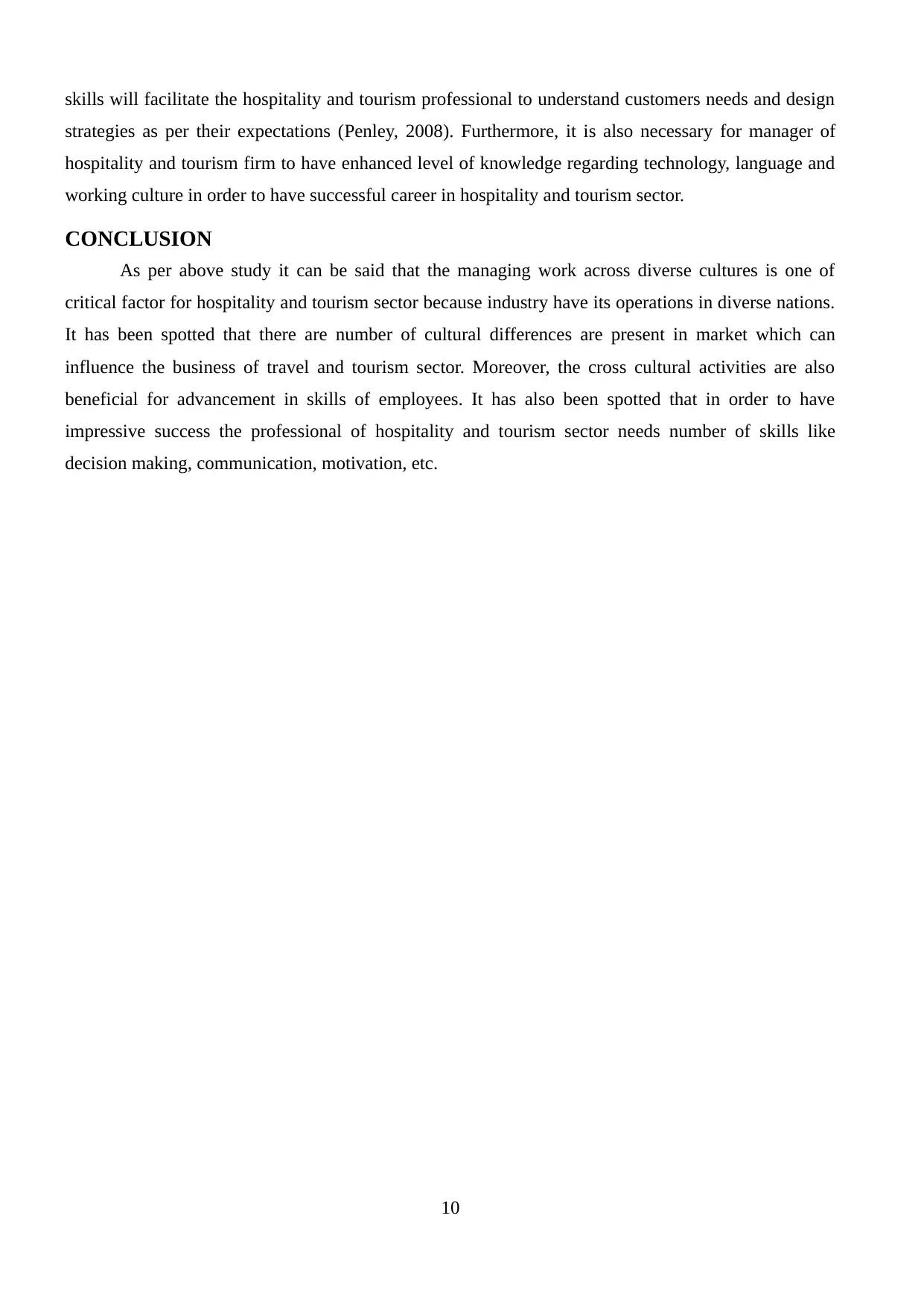
skills will facilitate the hospitality and tourism professional to understand customers needs and design
strategies as per their expectations (Penley, 2008). Furthermore, it is also necessary for manager of
hospitality and tourism firm to have enhanced level of knowledge regarding technology, language and
working culture in order to have successful career in hospitality and tourism sector.
CONCLUSION
As per above study it can be said that the managing work across diverse cultures is one of
critical factor for hospitality and tourism sector because industry have its operations in diverse nations.
It has been spotted that there are number of cultural differences are present in market which can
influence the business of travel and tourism sector. Moreover, the cross cultural activities are also
beneficial for advancement in skills of employees. It has also been spotted that in order to have
impressive success the professional of hospitality and tourism sector needs number of skills like
decision making, communication, motivation, etc.
10
strategies as per their expectations (Penley, 2008). Furthermore, it is also necessary for manager of
hospitality and tourism firm to have enhanced level of knowledge regarding technology, language and
working culture in order to have successful career in hospitality and tourism sector.
CONCLUSION
As per above study it can be said that the managing work across diverse cultures is one of
critical factor for hospitality and tourism sector because industry have its operations in diverse nations.
It has been spotted that there are number of cultural differences are present in market which can
influence the business of travel and tourism sector. Moreover, the cross cultural activities are also
beneficial for advancement in skills of employees. It has also been spotted that in order to have
impressive success the professional of hospitality and tourism sector needs number of skills like
decision making, communication, motivation, etc.
10
Paraphrase This Document
Need a fresh take? Get an instant paraphrase of this document with our AI Paraphraser
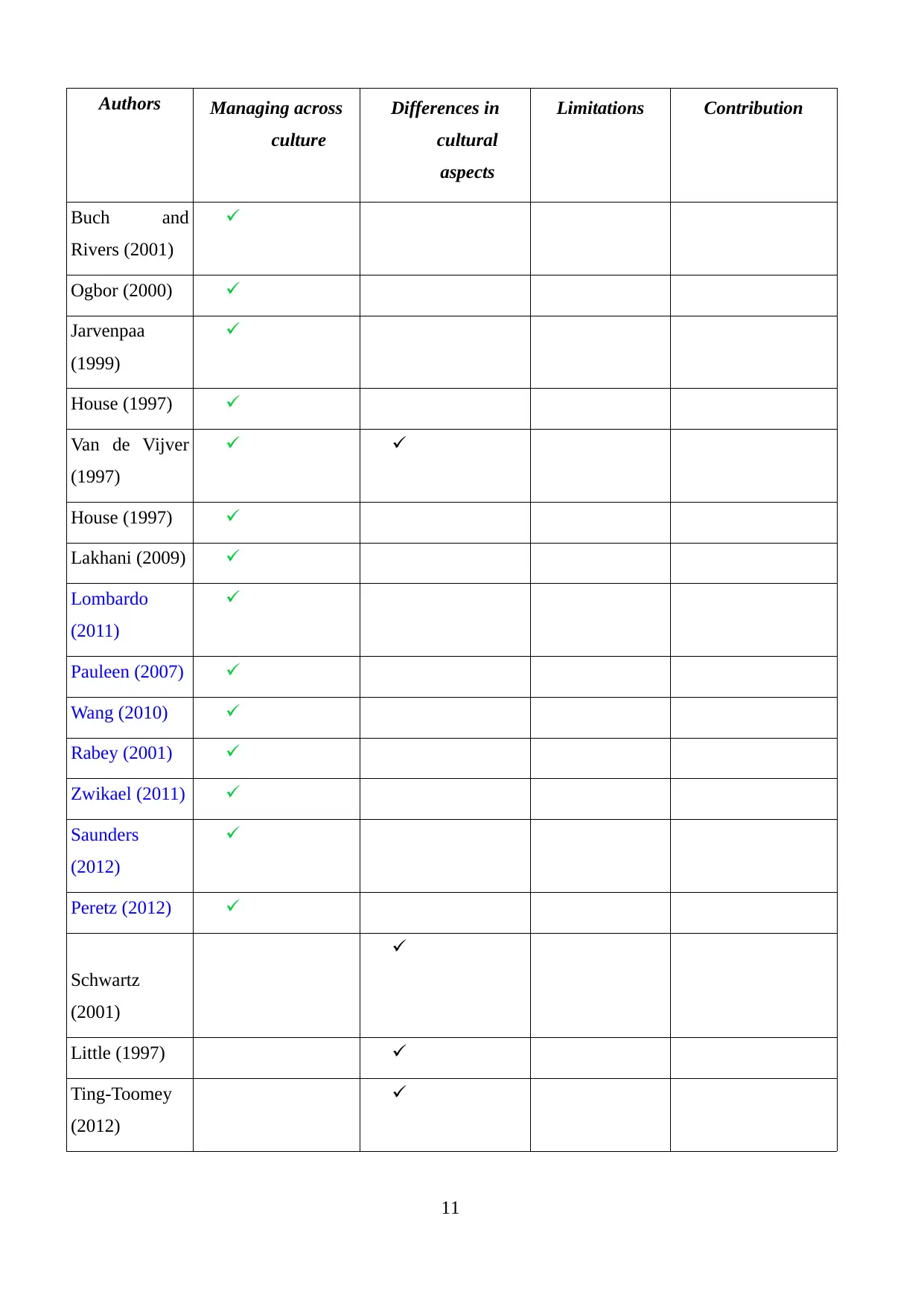
Authors Managing across
culture
Differences in
cultural
aspects
Limitations Contribution
Buch and
Rivers (2001)
Ogbor (2000)
Jarvenpaa
(1999)
House (1997)
Van de Vijver
(1997)
House (1997)
Lakhani (2009)
Lombardo
(2011)
Pauleen (2007)
Wang (2010)
Rabey (2001)
Zwikael (2011)
Saunders
(2012)
Peretz (2012)
Schwartz
(2001)
Little (1997)
Ting-Toomey
(2012)
11
culture
Differences in
cultural
aspects
Limitations Contribution
Buch and
Rivers (2001)
Ogbor (2000)
Jarvenpaa
(1999)
House (1997)
Van de Vijver
(1997)
House (1997)
Lakhani (2009)
Lombardo
(2011)
Pauleen (2007)
Wang (2010)
Rabey (2001)
Zwikael (2011)
Saunders
(2012)
Peretz (2012)
Schwartz
(2001)
Little (1997)
Ting-Toomey
(2012)
11
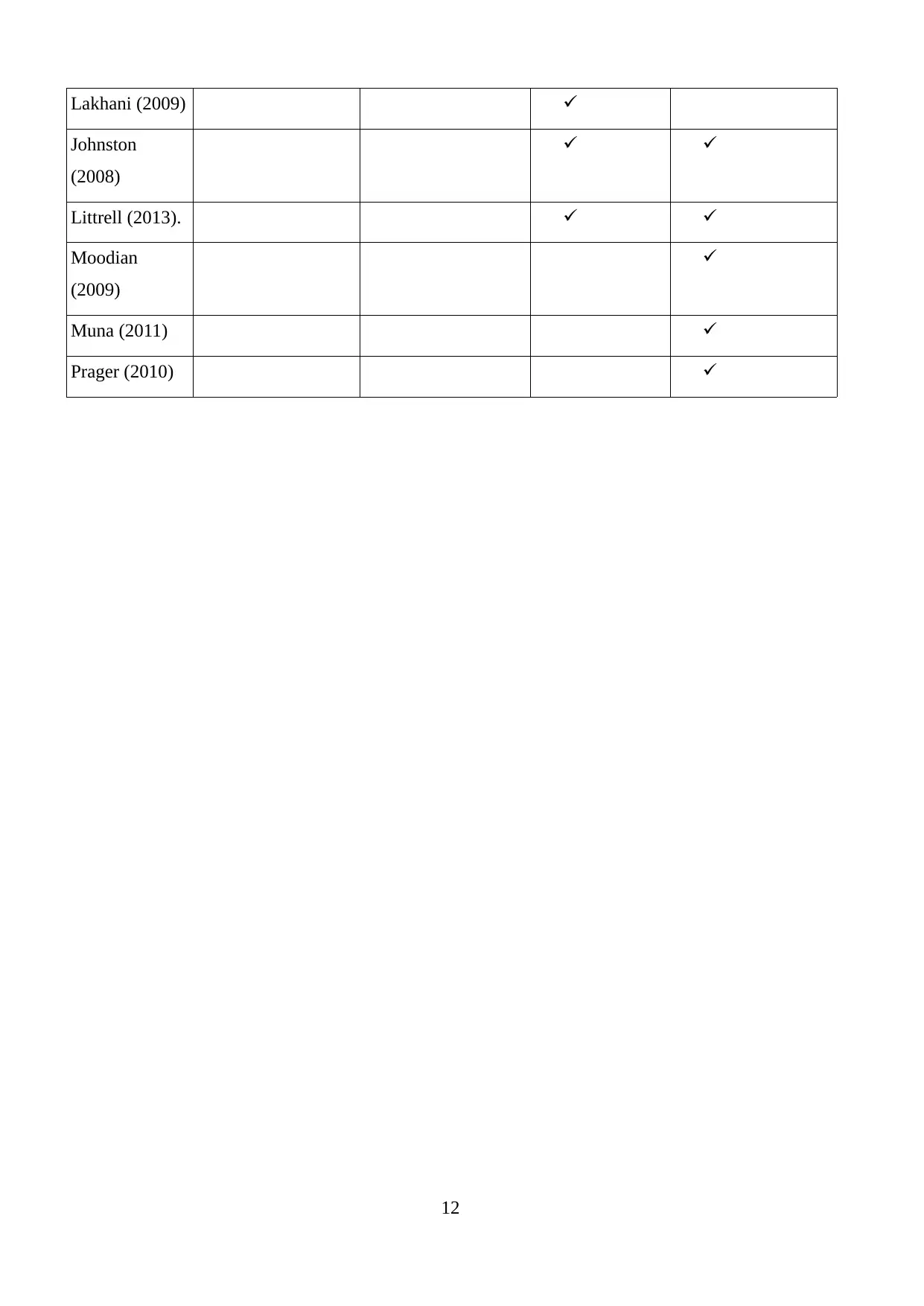
Lakhani (2009)
Johnston
(2008)
Littrell (2013).
Moodian
(2009)
Muna (2011)
Prager (2010)
12
Johnston
(2008)
Littrell (2013).
Moodian
(2009)
Muna (2011)
Prager (2010)
12
⊘ This is a preview!⊘
Do you want full access?
Subscribe today to unlock all pages.

Trusted by 1+ million students worldwide
1 out of 14
Related Documents
Your All-in-One AI-Powered Toolkit for Academic Success.
+13062052269
info@desklib.com
Available 24*7 on WhatsApp / Email
![[object Object]](/_next/static/media/star-bottom.7253800d.svg)
Unlock your academic potential
Copyright © 2020–2026 A2Z Services. All Rights Reserved. Developed and managed by ZUCOL.





